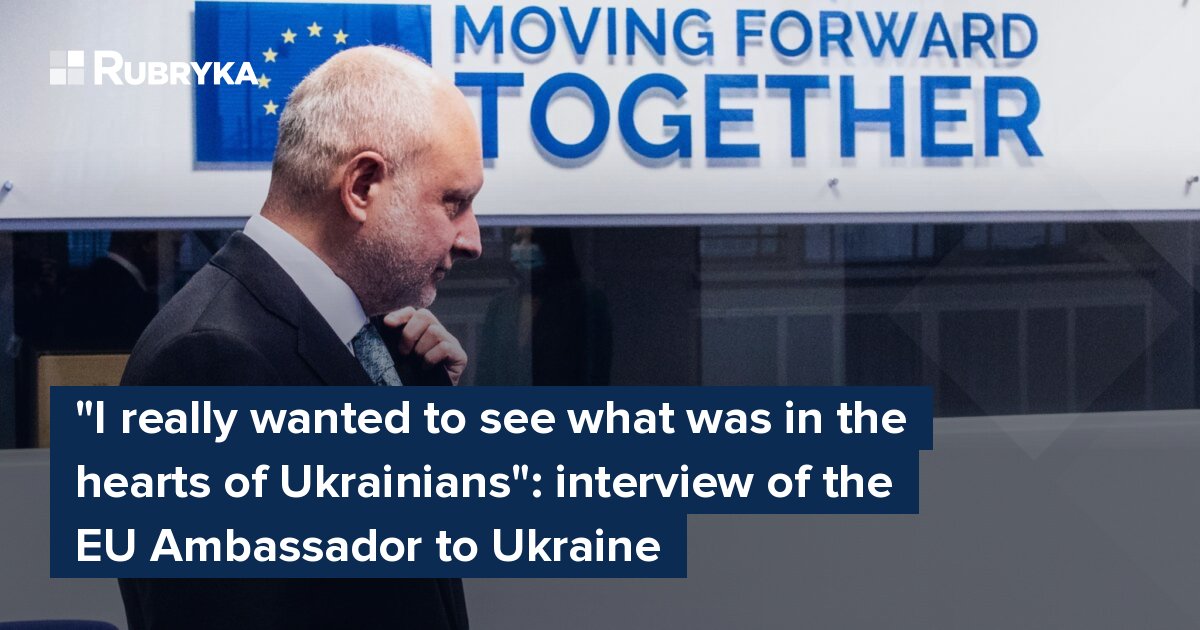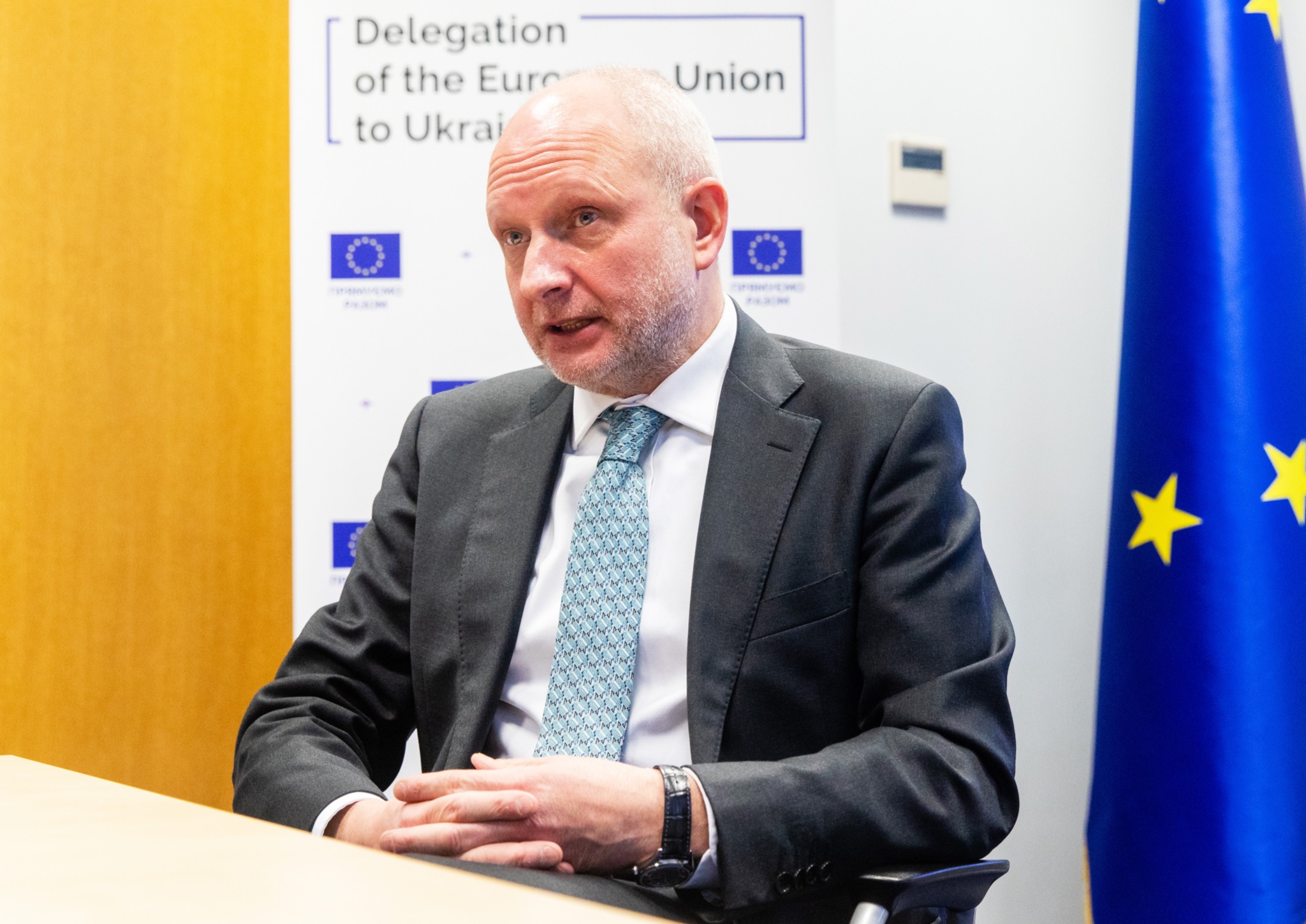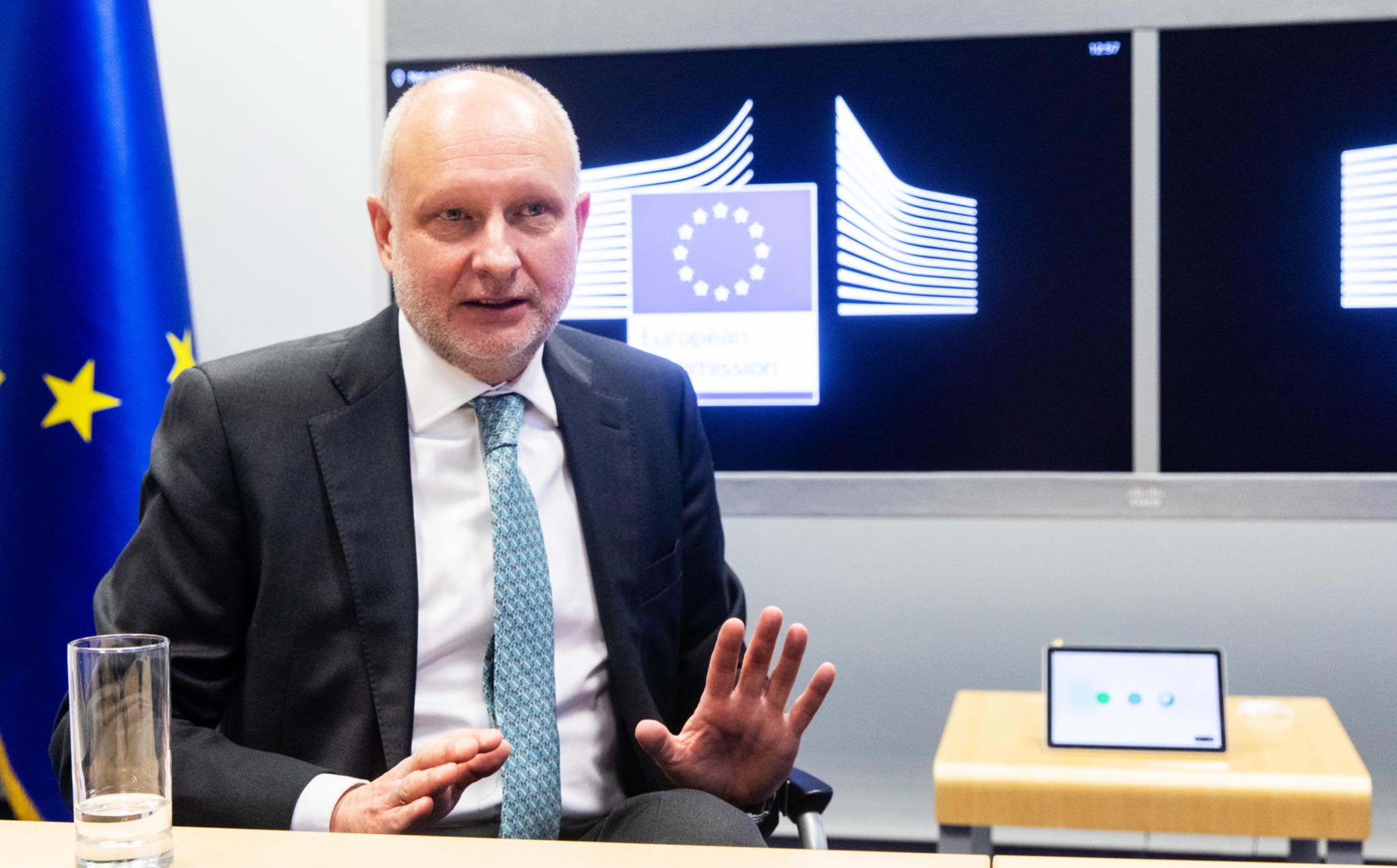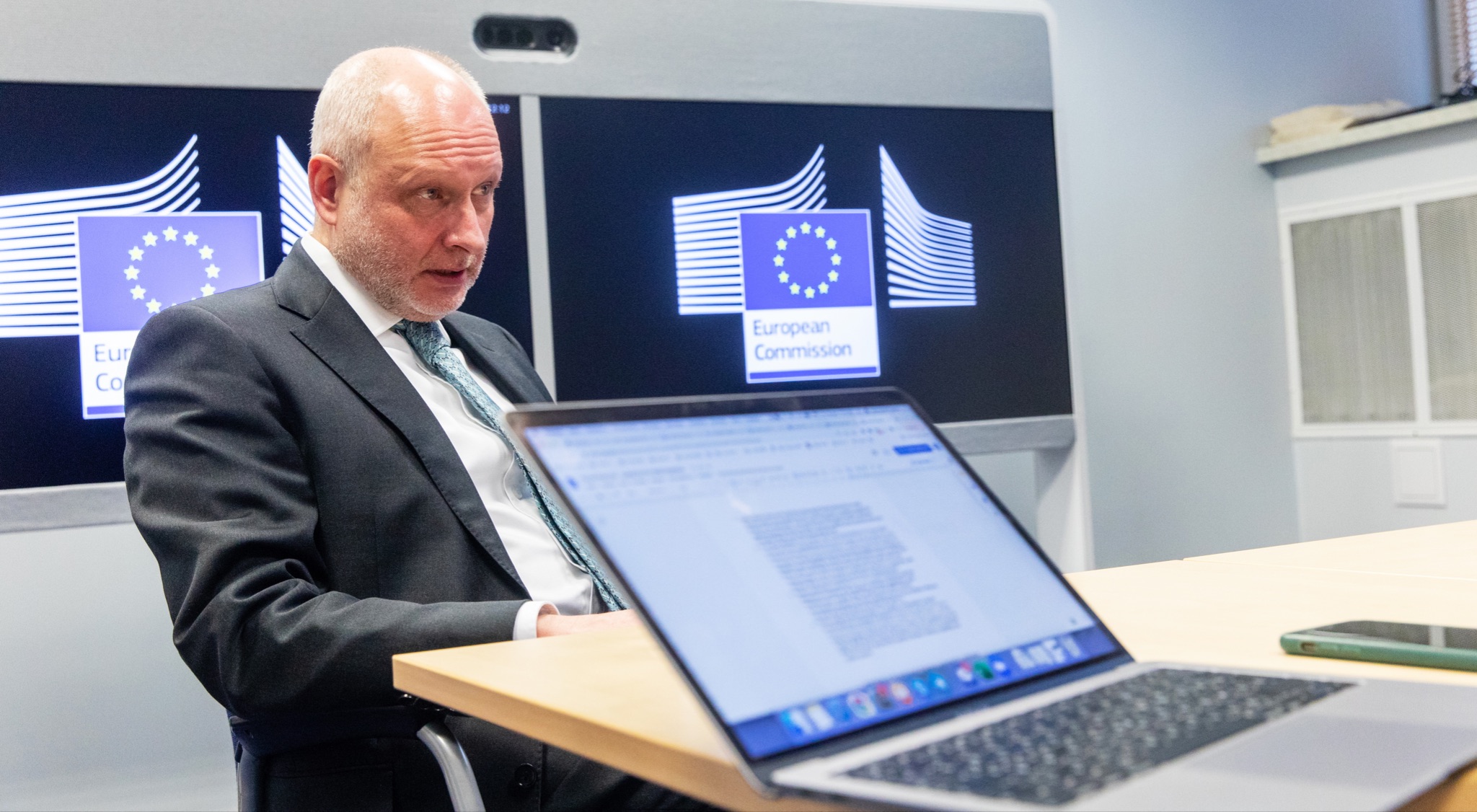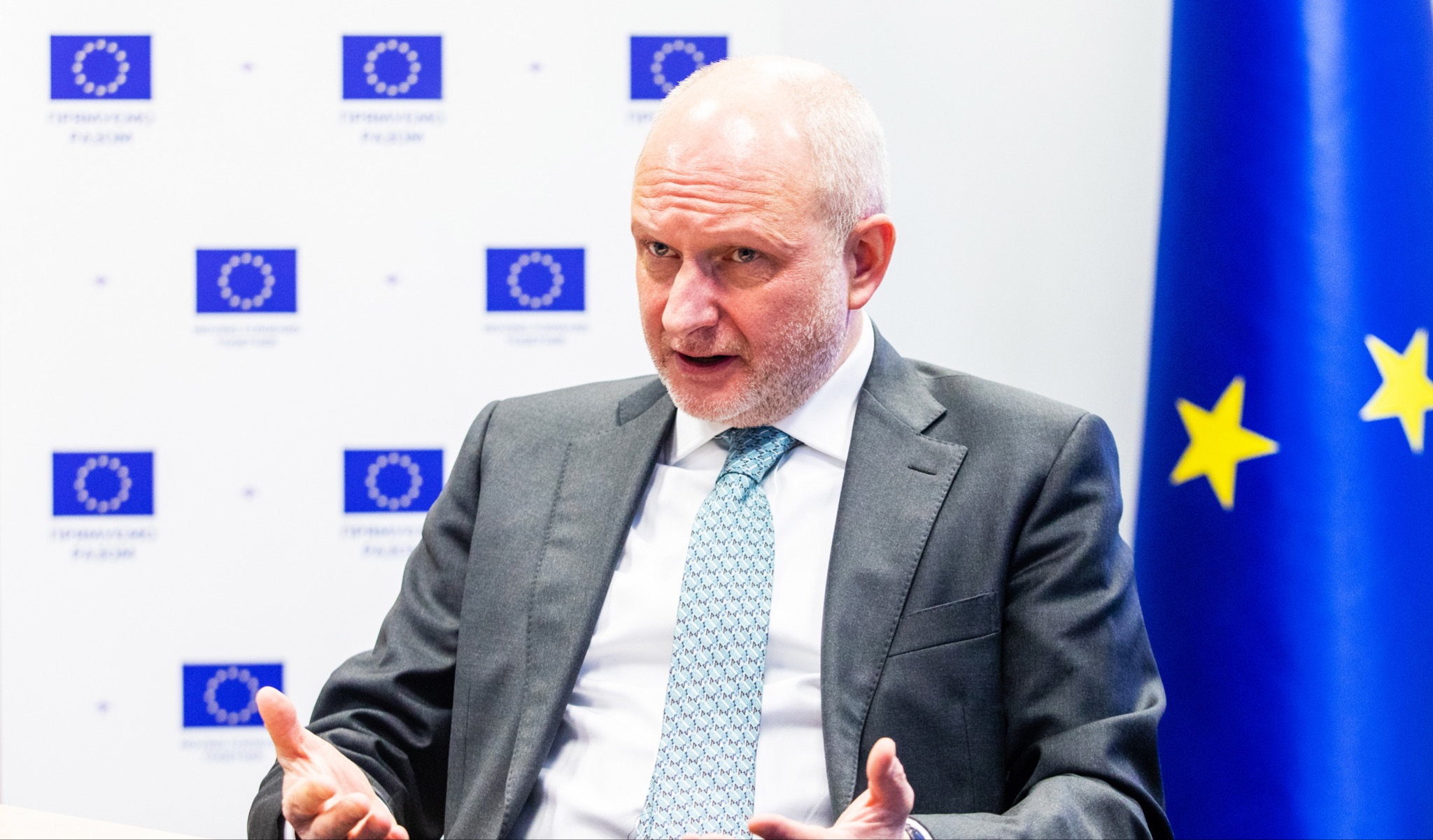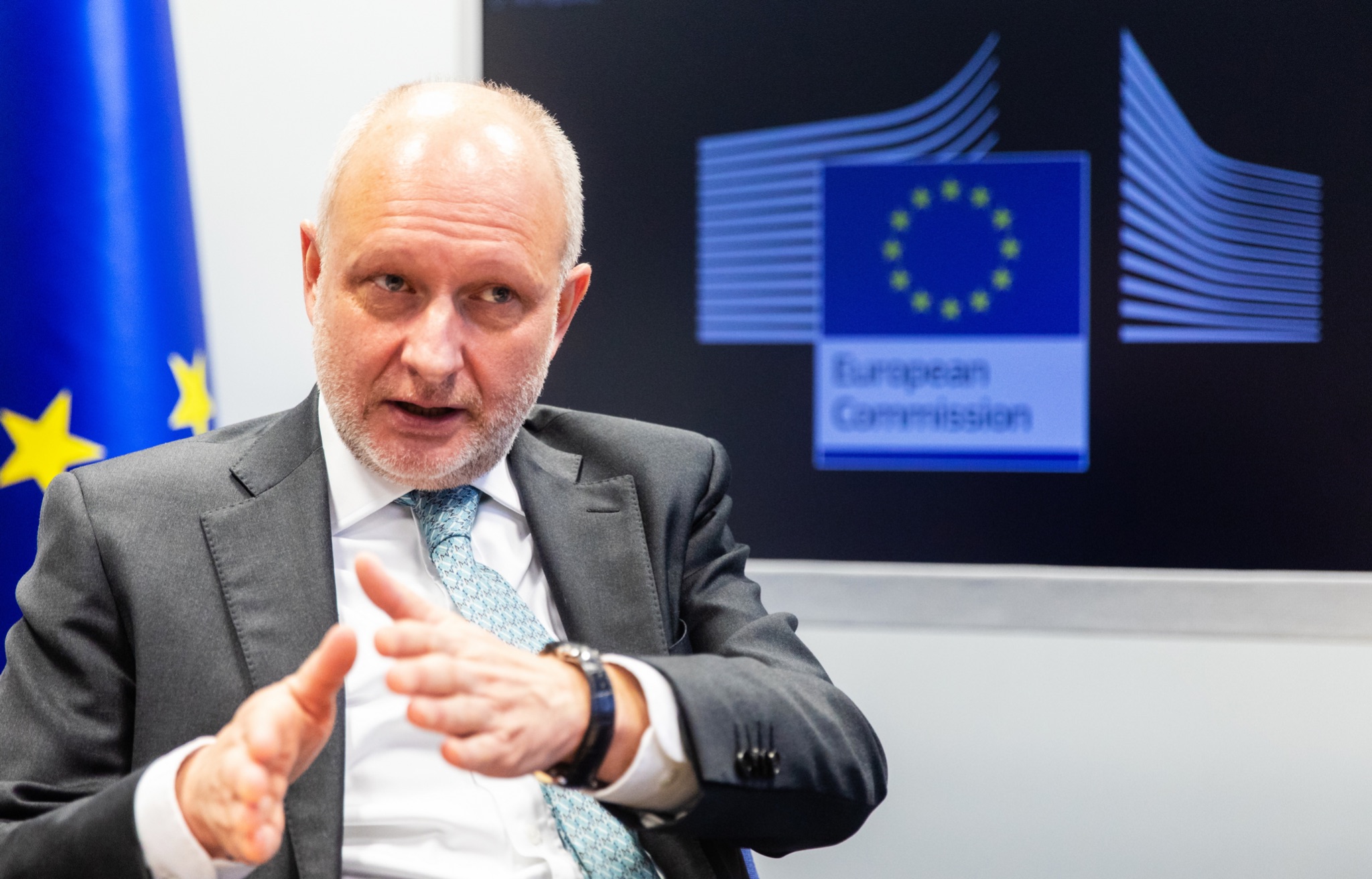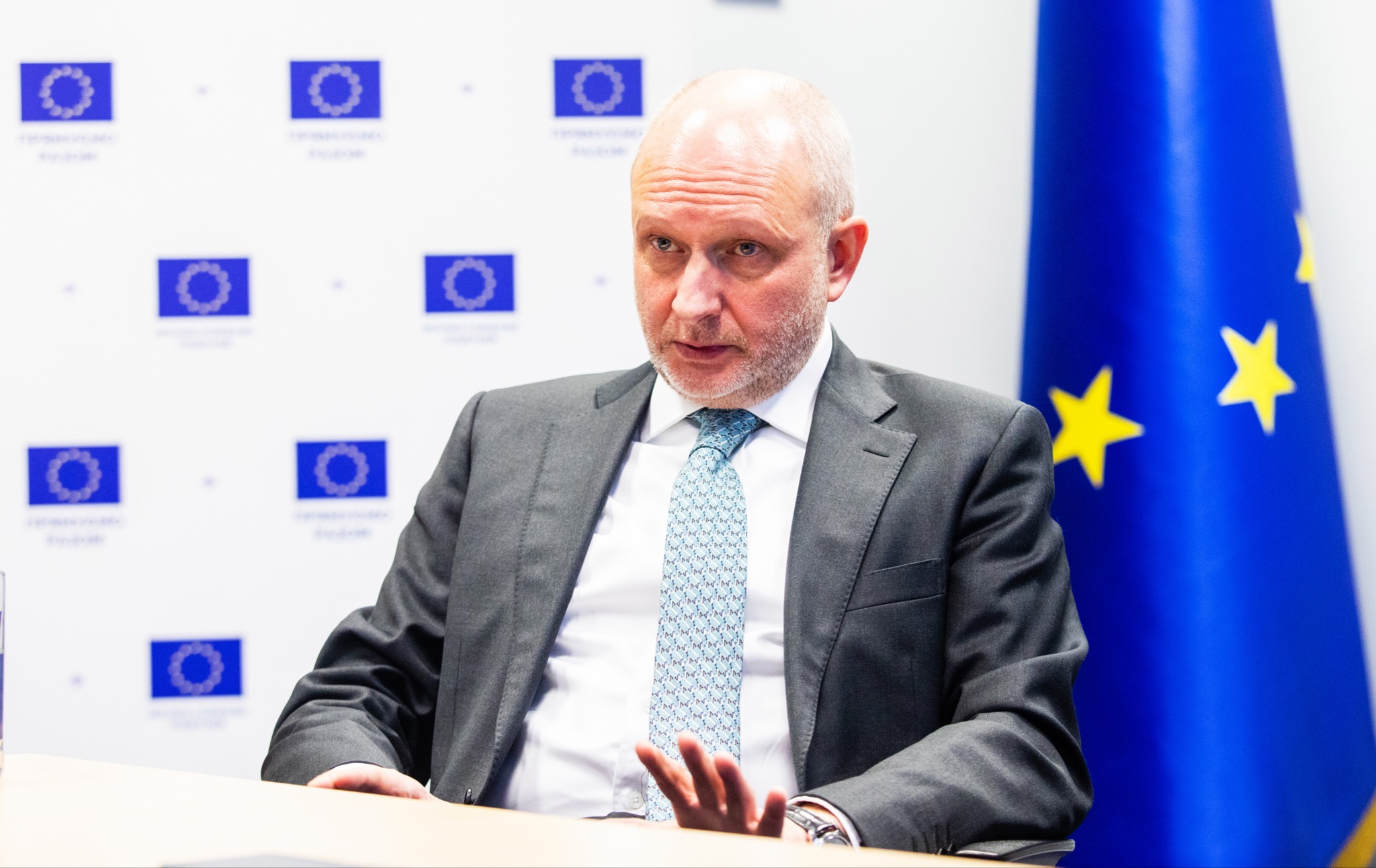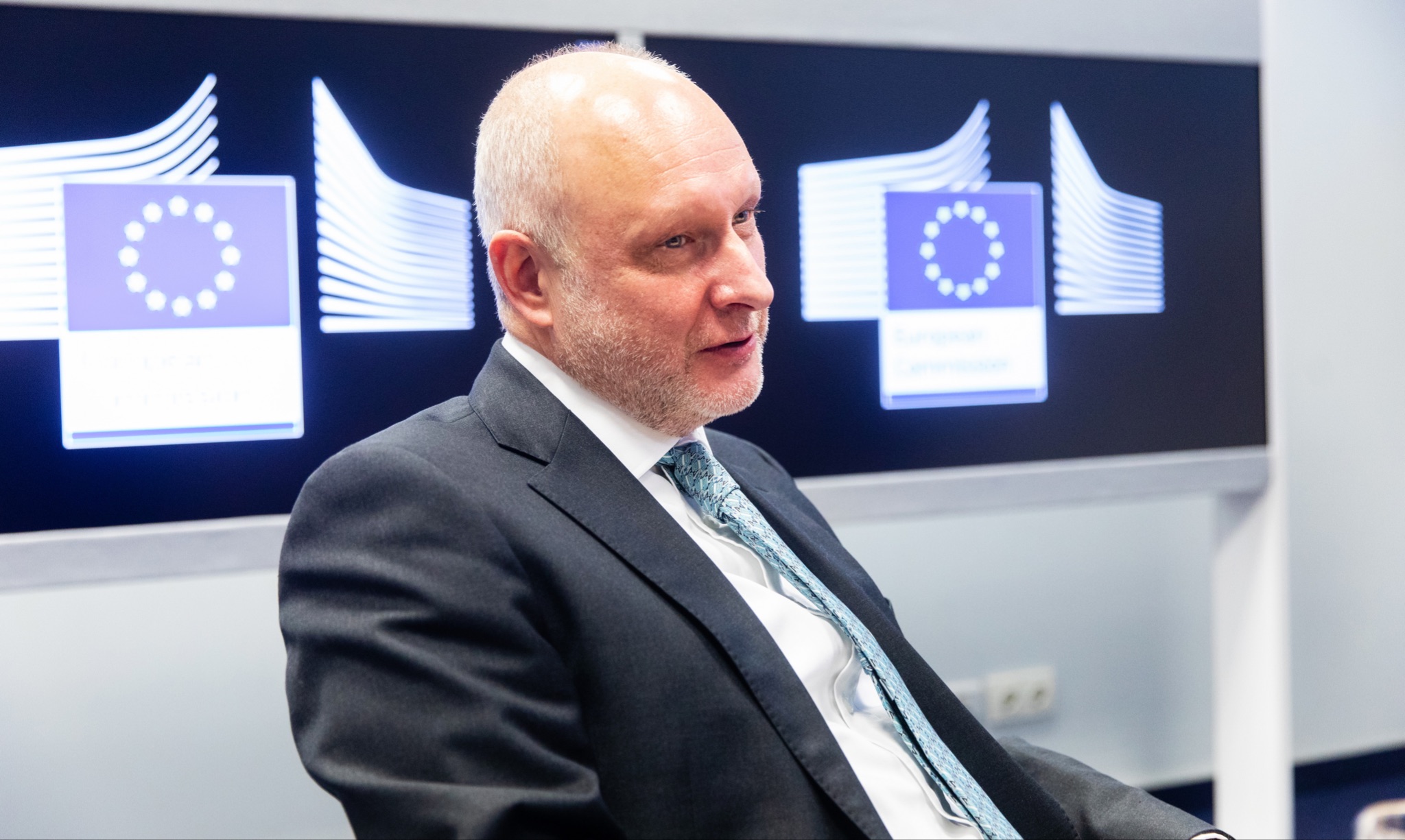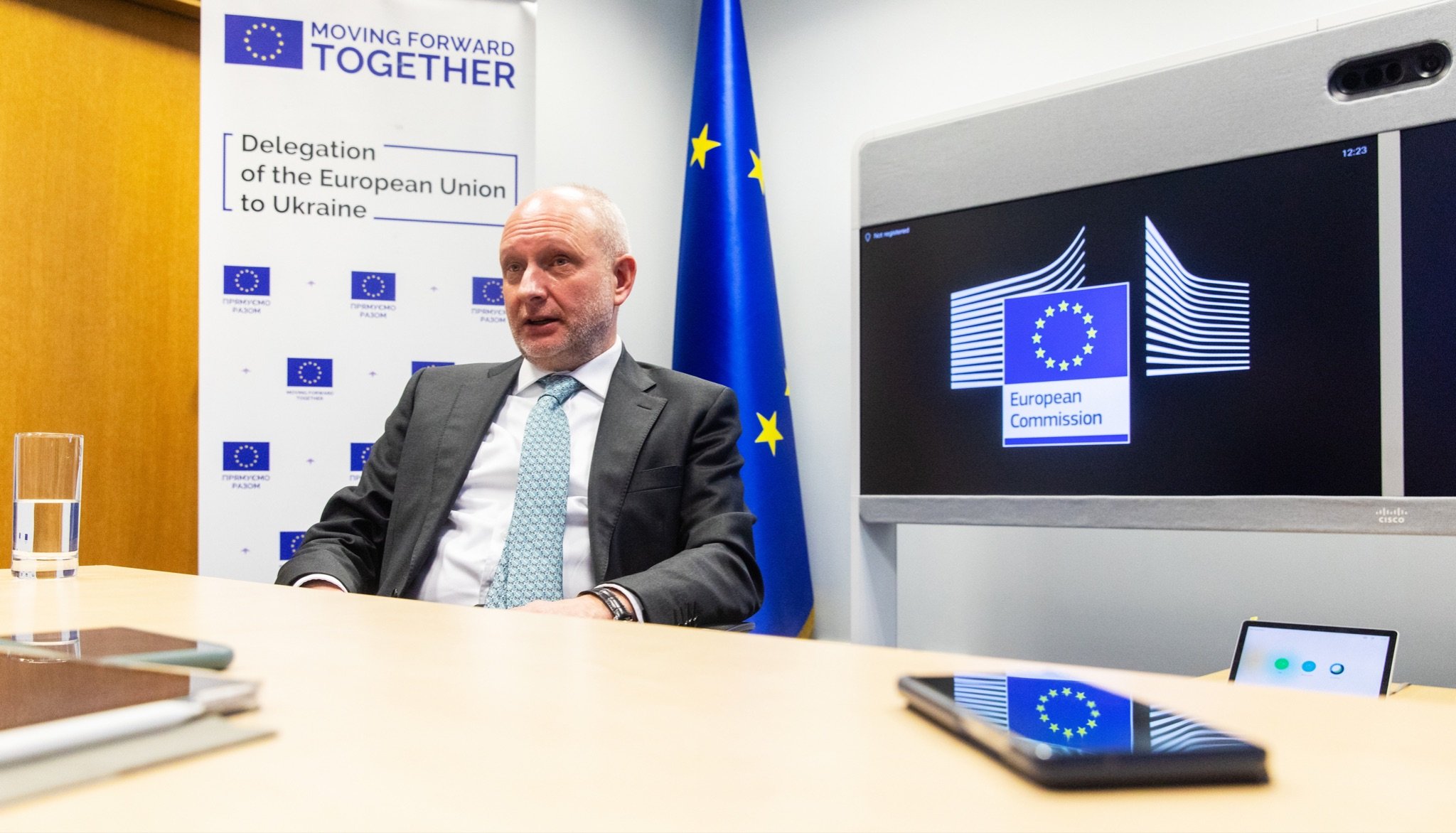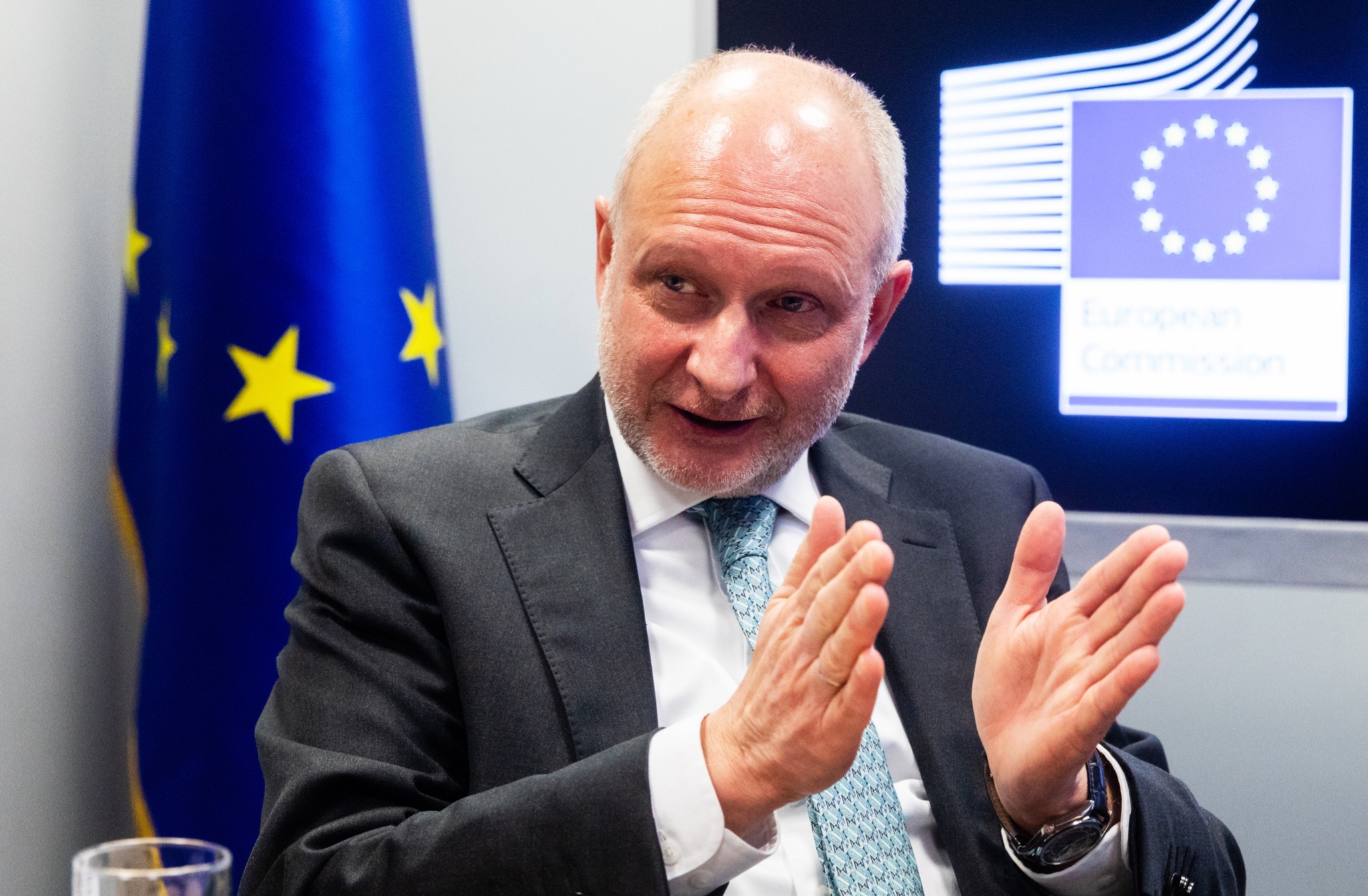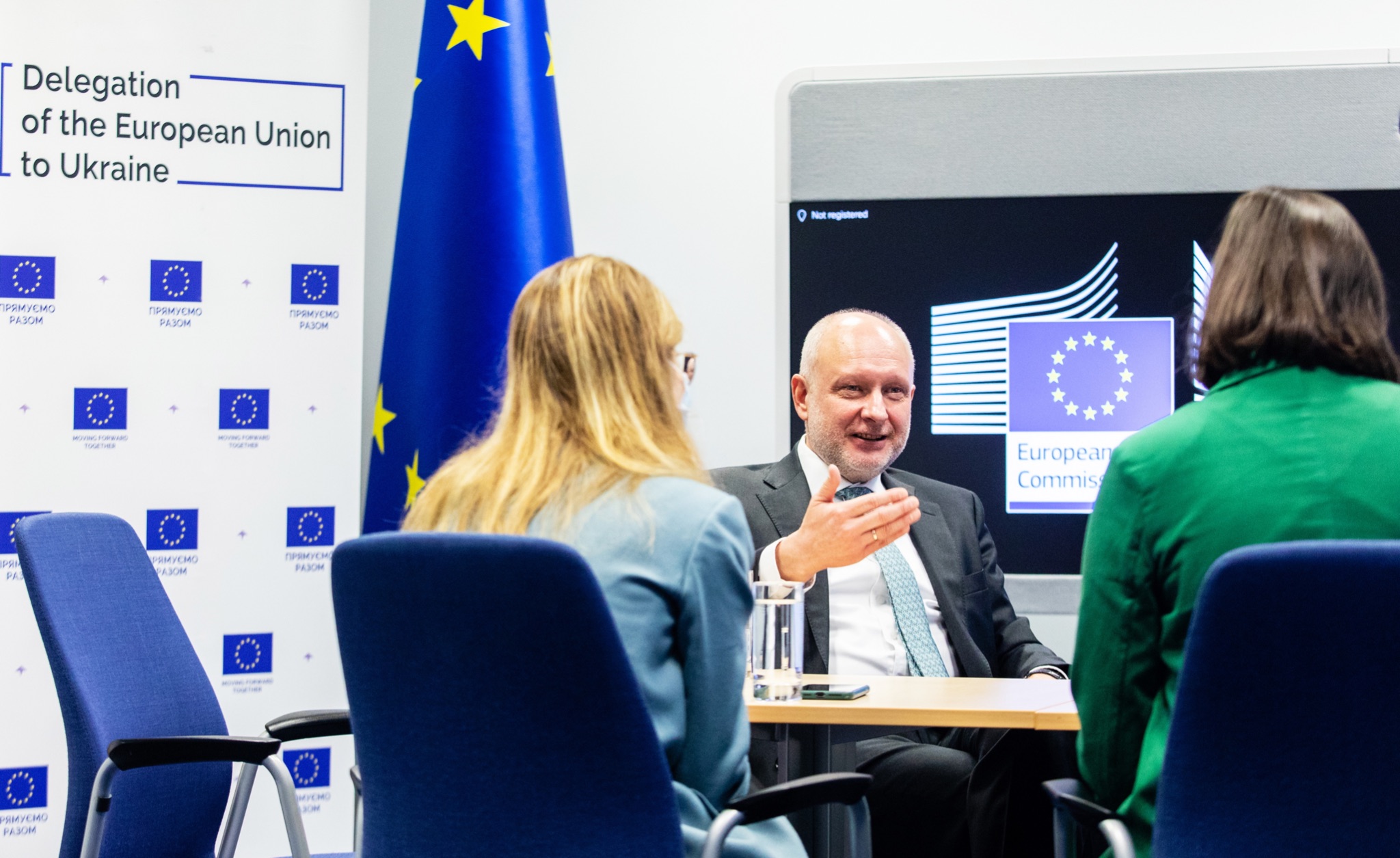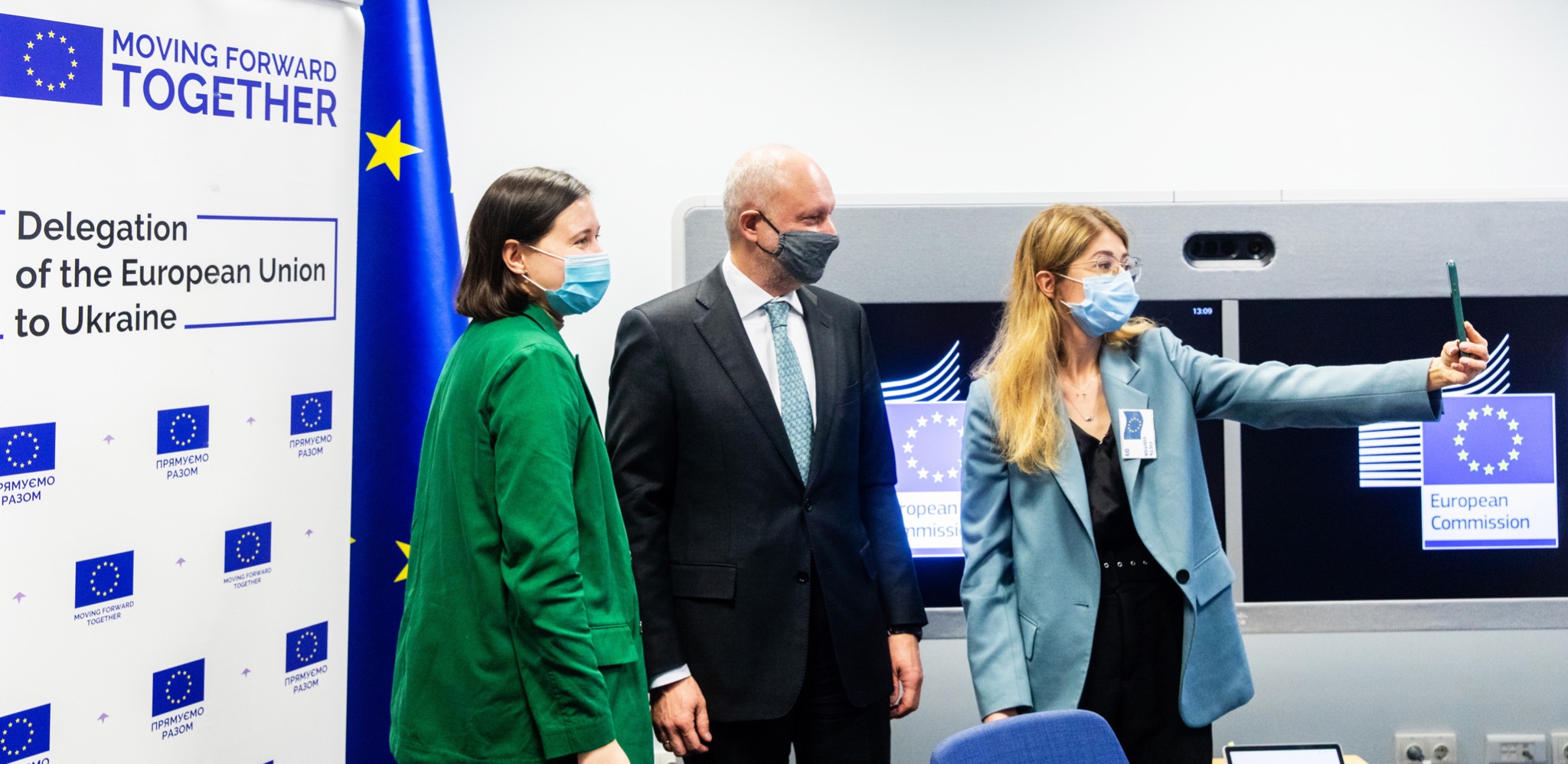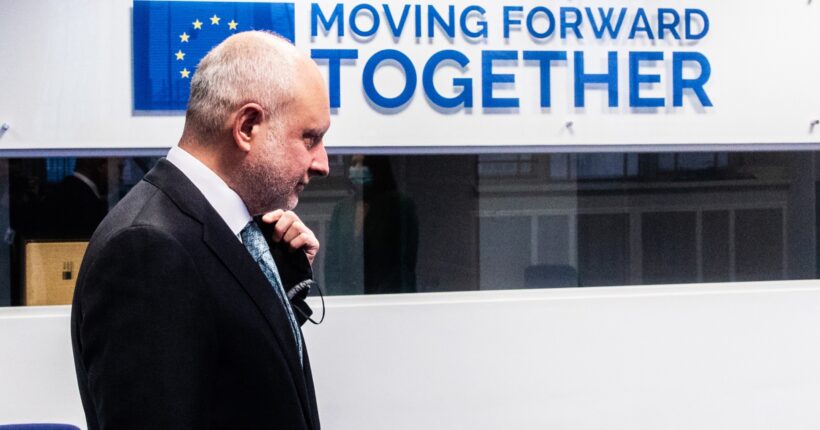
Photo: Rubryka
Matti Maasikas has been the Head of the Delegation of the European Union to Ukraine since 2019. We visited the Delegation's office in Kyiv to ask the Ambassador what kind of support to expect from the EU in the face of the growing Russian threat, how the EU has been helping us, and what fields in Ukraine the EU is ready to invest billions of euros in.
Russian threat: an EU insider's view
− Lately, there's been more alarming news about Russia planning to invade Ukraine further and escalate the war. The EU has been a massive support to Ukraine in the past years, and now there are talks about harsher sanctions against Russia by the EU and the USA. Could you specify what sanctions we should expect?
− First, let me say that the Russian sabre-rattling is entirely unacceptable, and we all in the EU, as in the wider West community and NATO, are worried about that. You have seen that intense diplomatic work is ongoing to deter further possible aggression. Both the US and the EU are doing preparations for broader measures. However, the details of the measures will not be communicated publicly.
On December 16, the European Council met, and Russia was on the agenda. It is a normal logic of diplomacy and foreign policy that you don't go out with the list of the measures. You don't reveal your hand. But these issues, these measures, will be discussed diplomatically and, I think, communicated. Those who need to know will know.
− Could you tell us about the measures that have already been taken? What are the steps already taken to avoid it, in particular, by the EU in cooperation with Ukraine? What are the ways the EU supports Ukraine's defense capability and border control?
− Indeed, there is a wide range of measures that the EU has been doing to support Ukraine. In 2014, Russia started its aggression against Ukraine, and since then, the EU's support of Ukraine's independence, sovereignty, and territorial integrity has been unwavering. The EU supports all the diplomatic efforts and formats; we are the biggest contributors to the OSCE Special Monitoring Mission. The EU member states are party to the Normandy format talks. With almost 1 billion euros, we have supported the regions and areas affected by the conflict in Ukraine, building hospitals, helping the internally displaced people find new jobs, building infrastructure, etc. And there has been a substantial package of sanctions in place, both against individuals and economic sanctions. These are under two broad regimes. One concerns Crimea; there is, in fact, an investment ban in force from the EU side, and then the Donbas-related sanctions.
In 2014, I represented Estonia in the EU when the first sanctions were introduced. I wondered back then: is this sufficient? Do the sanctions have a deterring effect? But I also had to acknowledge how big that step was to introduce sanctions against a permanent member of the UN Security Council, an important trading partner for many member states, etc. So this package has been enforced since then, it has been updated; it is under constant review; it has been rolled over every six months, and it's a solid policy framework in place.
I would also like to mention the recent decision of 31 million euros from the European Peace Facility; it was the first time the EU can support the military. And we will allocate those 31 million euros within the next 18 months. It is not for weapons, but for field hospitals, logistical units, fighting on the cyber front.
− At the Eastern Partnership summit (December 15), Zelenskyy said that sanctions as a reaction to the escalation of Russian aggression "interests no one," while it would be wiser to enforce pre-escalation sanctions. Indeed, European support for Ukraine is essential and even vital. Then there possibly won't be any escalation. What do you think about that? What are the plans of the EU?
− I'm well aware of the Ukrainian position and the philosophy of pre-emptive sanctions. And some EU member states support that as well. But all in all, it's the position and philosophy that we have a sanctions package ready. See what the President of the European Commission, Ursula von der Leyen, has repeatedly said. But we will not wave it. But we make clear that Russia knows what will happen if it escalates the conflict further.
− Speaking about Russia knowing things. It's been repeatedly said that the Nord Stream can be the leverage to influence Russia. The government of Germany suspended the certification process on November 16. It has also been specified that Ukraine will be part of the so-called "risk group." Could you specify what role Ukraine will have there? What is the place of Ukraine in European energy security after the Nord Stream 2 starts functioning?
− Nord Stream 2 is not an EU project. It's a project of some member states. Second, when the Nord Stream 2 project was launched, the EU tightened its energy legislation. More precisely, the gas directive. It was made clear again at the EU-Ukraine summit on October 12 that the Nord Stream 2 must comply with every bit of the EU legislation. And that's what the verification process is about. I must say I, of course, heard and understood the Ukrainian wish to be part of this verification, but I was not very optimistic at the beginning that it would be possible, that the will would be there. But the will is there – the German regulator has invited Ukraine to take part. And the Commission President von der Leyen also promised that Ukraine would be part of it at the summit. After the verification process in Germany, it will go to the EU Commission, and Ukraine will be part of it. It's about how this project is complying and will comply with the EU's legislation.
Now, about Ukraine's role, should this pipeline work one day. Again, at the summit and the follow-up for the EU and the US, if you look at the US-Germany statement from July, it is clear that Ukraine must remain a transit country. Ukraine is a reliable transit country. And you may recall that the current transit agreement from December 2019 was achieved with the facilitation of the European Commission. So the EU has, of course, a vital interest there. The EU is ready again to facilitate and take part in it. It is in the EU's interests as well. But coming from Estonia, I cannot help but ask: what is there beyond transit? (smiles). Shouldn't one start thinking of Ukraine beyond transit? What would be the investments needed? What would be the domestic gas extraction? What investments will the infrastructure need to be self-sufficient?
I understand why the discussion is so focused on this pipeline, but there are other issues as well.
− Do you think Ukraine has the potential to be self-sufficient energetically?
− Yes, absolutely. First, if Ukraine had the energy efficiency level at the worst-performing EU member state, Ukraine would be self-sufficient in energy already today. I know there is a need for billions of euros; we all know that. And President Zelenskyy at the EU-Ukraine summit raised this issue, making it clear that it is well known for Ukraine's leadership.
You conduct your gas extraction. And everything related to the energy transition, green deal-related investments, renewable energy, and part of this would be good maintenance of the nuclear power plants you have. As always in the energy area, long-term strategies are needed, треба мати план (you need a plan, Ukr.) (smiles). An awful lot of investments are required. It's something that can be planned. And it's also something for what Ukraine can lure investments from Europe.
EU-Ukraine Summit, trade, and "open sky": "a conclave of people working together on the same issues"
− In October, there was an EU-Ukraine Summit. In your opinion, what are the main and most important accomplishments that were reached there?
− First, the good working atmosphere. I want to highlight that. At the summit, there are two parties: the EU and Ukraine. But actually, it was, if you will, a conclave of people working together on the same issues. That's really important. We are working with one goal to bring Ukraine closer to the EU. You could touch it with your own hands at that summit.
The EU's unwavering support of Ukraine's sovereignty, independence, and territorial integrity was not only reaffirmed but in the joint statement following the summit a stronger wording than previously was agreed. It's a joint statement between the EU and Ukraine. For the first time, Russia was called a party to the conflict in the East of Ukraine, not the mediator – a role in what they wanted to pretend to be. There was a stronger acknowledgment of the Ukrainian initiative of the Crimean Platform, which is an incredibly important thing. Again, having spent the first 25 years of my life in occupied Estonia, I remember very well the Baltic states' incorporation into the Soviet Union was never recognized by most Western countries. I recollect what did that mean. Those countries' diplomats could not officially visit the Baltic Soviet republics, and there were no heads of states´ visits; that was pretty much it.
Now, in Crimea, we have a strong sanctions regime in place. I think the Ukrainian leadership wisely decided to raise the diplomatic and political stakes to draw more political attention to the Crimea illegal annexation issue.
Then a wide range of energy-related issues was discussed: the Nord Stream 2, the energy supplies, energy prices. High-level working group on gas and electricity market integration was established.
Another block on the economy touched upon was future investments.
Very importantly, the assessment process of the Association Agreement's objectives achievement was discussed. The Agreement foresees a review, not reopening for further amendments because that would take a ratification process in Ukraine and all the member states and the European Parliament. But many things could be done within the framework of the current Agreement, and there are trade issues and alignment of regulations and legislation that could be stepped up, etc.
For the summit, both sides produced their own assessment, and within the next year, we will come out with a common set of recommendations on how to make the Agreement work even better for us.
And of course, in the margins of the summit, three significant agreements were signed and there is one that I want to underline especially. The Common Aviation Area Agreement. Long overdue…
Overall, it was an excellent summit. And I have seen summits.
− You've mentioned that both sides made assessments. What does the EU see as the most important things that should be addressed immediately?
− The better any partner is aligned with the EU regulations, the better the partner country can trade with the EU. The EU is the biggest single market globally and very wealthy. Anybody who wants to trade with us needs to follow our standards.
There are many things and areas where Ukraine could better benefit its citizens and companies by adopting the EU standards. An enormously important area is the rule of law, fight against corruption, justice, where the Association Agreement provides an invitation to dance (laughs). It provides an invitation, incentive and models for reforming Ukraine according to the best EU practices. By doing that, Ukraine would become a better place for its citizens because that's the primary aim of them, and Ukraine would become a much more attractive place for potential investors.
The justice reform in Ukraine is crucial for potential investors. It's enormously important for any country. Back in the 1990s, the main slogan for Eastern Europe, like Poland and Baltic countries, was "Privatize!". Privatize, then the economy starts working. In hindsight, some of those countries' leaders say that the rule of law and court system were the most important things. Any potential investor, be it foreign or Ukrainian, wants to have this certainty that if things go wrong, they can expect to get justice from the court. Unfortunately, in today's Ukraine, investors cannot fully have this certainty. Looking at some surveys among businesspeople, potential investors, the American Chamber's of Commerce survey this autumn showed that up to 70% of respondents named the court system as the first deterrent. And then the rule of law in general. I'm incredibly proud that the legislation has been passed under the current leadership to enable for a sweeping, comprehensive justice reform for the first time in 30 years. The international partners did play and are playing the role, including the EU. We have EU nationals in the Ethics Committee for the High Council of Justice and the High Qualification Commission of Judges Selection Committee. It's enormously important to get this done.
− At the summit, it was mentioned that the EU would mobilize 6 billion euros in public and private investment for Ukraine. Further details were not revealed. Could you comment on that? May there be a crucial field the "investment" will go to?
− Under the economic and investment program, we estimate that 1,4-1,5 billion will be in grants; together, we will be bringing and blending private and international financial institutions' money. This sum could be 6 billion for Ukraine, maybe even a bit more. There will be five flagship, the five most important areas where we want to see these investments going. It's support for small and medium-sized enterprises; up to 100 thousand of those could benefit, and 10 thousand small farmers will also benefit from that. A development with revolutionary potential was the opening of the land market. The very basis of agriculture as an economic area is that if the farmer goes to the bank and needs a loan to buy a tractor, they could use their plot of land as collateral. And this was missing in Ukraine.. Now it's there.
Three other flagships are digital transformation, energy efficiency, and helping connectivity by upgrading border crossings. Extremely important and very practical.
− Is there a timeline for this already?
− The EU's budget, including this plan, has been decided for seven years, so it all needs to happen in the coming years.
− It was also stated that the Agreement on Conformity Assessment and Acceptance of Industrial Products would be signed within the next year's EU-Ukraine Summit. Seen as a breakthrough deal, it simplifies the access to the EU market for Ukrainian raw materials and value-added products. Could you tell us what this means for Ukraine and what conditions will be for the cooperation?
− The EU, with its biggest and wealthiest single market, indeed takes excellent care of its consumers. Consumer protection is sacred in the EU. And we need to know that all the products we sell in the EU markets do correspond to our very high standards. The ACAA process is to provide for some industrial goods; there is no need to check every time if this or that product complies with the standards. It is about the EU's trust towards Ukrainian standardization processes and oversight authorities, institutions and legislation to start with. That's why the ACAA process is auspicious, but goes very deep and is very detailed. That is what we are doing for the second year; we are turning each and every stone in Ukraine in these areas and seeing whether the mechanism is in place, and the legislation is in place, etc. This assessment should be over by summer 2022. Then we will have a list of the things that Ukraine still needs to do, and then it will be up to the Ukrainians to tick those boxes. I sincerely welcome the Ukrainian leadership's ambition, because a positive ambition can bring marvelous results.
− One of the summit's accomplishments was the 'open sky' Agreement. While many Ukrainians are happy with this decision, Ukrainian airlines (SkyUp and UIA in particular) are not very content. They say that the Agreement might be harmful to Ukrainian airlines as now the Agreement does not create uniform game rules for Ukrainian and European airlines. What would you reply to such concerns? Will there be the same opportunities for Ukrainian airlines in the EU?
− The Common Aviation Area Agreement is about reciprocity. Same standards and requirements for everyone.
Enhancing competition is often not quite comfortable for those who have already established themselves in the previous conditions. How uncomfortable the national government-owned carriers felt when the low-cost airlines came! Now they both are on the market, and more often than not, the old carriers needed to adapt and needed to acquire some business models and best practices from, say, Ryanair and, at that time, Easy Jet. It benefits the consumer. And we have already seen Ryanair announcing new routes in Ukraine. The Agreement is being implemented. Not ratified yet, but already being implemented. We see results.
And for those who fear competition, there are only two possible choices, either you adapt or go out of business.
On Ukraine's present and future: 'the most significant geopolitical shift in Europe of our times'
− Given the current pace of reforming our country, how long do you think it will take for Ukraine to join the EU?
− Nobody is in a position to give any timelines. What we have been witnessing since 2014 is Ukraine's shift from East/old to West/new democratic, liberal market economy. This turn of Ukraine is the most significant geopolitical shift in Europe of our times. As with everything in geopolitics, it takes time; it doesn't happen overnight. But it is also a very steady shift. Because the drive for this shift is not on Bankova Street (the Office of the President), not in Verkhovna Rada, not in the Cabinet of Ministers, it is in your society. It's in your society, it is why citizens went out to Maidan to demand and what they still demand.
It is about a genuine wish to make your country a better place. The EU has acknowledged this. And the EU is very proud. I am very proud that the membership in the organization that I represent is enshrined in your Constitution as the destination and destiny of your nation. Something that you have chosen yourself. Much work needs to be done on that path. Unfortunately, there are some elements that we don't have, like the promise of membership. But there are many elements that we do have. Most notably, we have the agreement framework in place. It is a very solid framework for our relations. It has enabled us to increase our trade and, most importantly, to allow Ukrainian people to travel to the EU using the visa-free regime to come to work and study, for Ukrainian businesspeople to communicate with their EU colleagues and counterparts; it has enabled Ukrainian officials to cooperate and work daily with the EU colleagues. This all brings us together closer every day. So that one very beautiful day, it will only come naturally to start discussing Ukraine's membership perspective.
− You mentioned geopolitics, and it's a stubborn thing. The national interests of countries in the geopolitical sense don't change easily. Ukraine has been trying to get away from Russia for many years. What do you think we have now that we haven't had before to make it possible to get into the EU?
− Before the Revolution of Dignity, it was not that clear to everyone. I can recall the talk of a "multi-vector" foreign policy. Now the vector is clear. The constitutional arrangement is of utmost importance. It is at the very basis of all aspects of the life of any state. Every day, Ukraine gets closer to the EU. That is something I see in my work. Not everything is linear, and not everything is straightforward. You, as Ukrainians, know better the hiccups, the frustrations; some things are not going that quickly, sometimes even some steps are taken backward, that need to be corrected, like the whole saga of the Constitutional Court last year.
− From March 1, 2022, the European Commission will lift the entry restrictions for citizens of the third countries vaccinated against coronavirus. It was reported by the press service of the European Commission. Could you tell us a bit about this new procedure, why such a step was taken and what this means for Ukrainians?
− Entry is the competence of the member states. The EU authorities can only give recommendations. Even when the EU council decided on the entry regimes under COVID, it remained a particular member state's decision. Like now, Ukraine is not on the green list for non-essential travel, tourism (people who needed to go for work were always able to), but still, ten member-states welcome Ukrainian tourists anyway, provided they are vaccinated.
The EU is not a superstate. It's a composition of its member states. So this proposal by the European Commission is an attempt to harmonize a bit more. How it will go, we don´t know yet. However, we all have witnessed during the year 2021 that it is always easier for vaccinated people to travel. Please, please, Ukraine, do vaccinate (speaks directly into the recorder). That is the best that you can do not only for your health and that of your loved ones and co-citizens; it's also the best you could do for your opportunities.
On Ukrainian sites, books, and language: "Literature, like everything in the Ukrainian culture, is fantastic'
− Our small tradition is to ask the Ambassadors about their favorite places in Ukraine and the places they would like to visit in the future. Could you share yours?
− If I have to start, I would say close to home. The Kyiv botanical garden is something that can offers for any season. I've been there with -15 °C in January, in autumn with all the flowers, and бузок (lilac) in May is fantastic. If I had to name one easily accessible place, it would be it.
I am a big admirer of the works of Mykola Gogol. So the visit to Poltava and especially to Dykanka was very touching for me; I also saw a bit of Myrhorod.
The route to Hoverla is not an easy path. It pretty much goes straight up. But it was so worth it to stay on the roof of Ukraine and look all around.
Lviv is a special place, a city that could be situated anywhere in central Europe. Also, Odesa. Speaking about it, I recently read The Five ("П'ятеро") by Volodymyr Zhabotynskyi, a fantastic piece of literature.
There are so many places. I was very impressed, including in a sad way, by what I saw on the bridge of Stanytsia Luhanska, where one could take pride in how civilized it has become, how much infrastructure there is, and how much international support it gets. And then you start thinking why it is all necessary, and how unfair is what happened to that place and the people living there. So many sites in Ukraine have impressed me.
− I am glad that you've already mentioned a book. Maybe you could recommend more to our readers?
− First of all, I have a few words about magazines. It is such a pleasure to witness how magazines like NV ("Новое Время") and even Elle have turned to Ukrainian. Finally! Good! (enthusiastically bangs his fist against the table).
I studied history, and I cannot help myself; history is the basis. If you start to accommodate yourself with the new country, it always makes sense to read history books. Serhii Plokhy is above anybody. If you only have time to read one book on Ukrainian history, take his The Gates of Europe.
Anne Applebaum with the Holodomor book has helped me tremendously. It is the political history of Ukraine in the 1920s. It's not only about famine but also about how they got there.
Timothy Snyder's early book on reconstructing the nations has a good chapter on Ukraine and how the Ukrainian nation evolved.
I have to admit it's quite an effort to read fiction in Ukrainian in contemporary Ukrainian literature. Often, I read the authors who are being translated: Andrii Kurkov is a brilliant writer. The way he captures the atmosphere in the country at a very personal level. The first Kurkov I read was The President's Last Love. It's not one of his most famous books, but the way he captures the distance between the nation and its authorities and leadership in this lonely president's personality struck me. And the latest, The Grey Bees, which I read in the original, is absolutely fantastic. He knows how to tell the Ukrainian story not only for Ukrainians, he is easy to translate and understand by the readers in the West.
Then, I was hit when I did the national dictation. You take probably the most sophisticated writer of yours and let them dictate their next book (laughs). I mean, come on! Yurii Andrukhovych, of course, stands out. I also recently read Serhii Zhadan's Depeche Mode and was very impressed.
Literature, like everything in Ukrainian culture, is fantastic.
− You speak Ukrainian: you even inserted a few phrases in Ukrainian during our interview. What's your motivation for learning the language?
− Це повага до українців. Це повага до України. Мова – це вікно до серця людей. Я дуже хотів бачити, що там у серцях українців. У мене чудова викладачка – Тетяна Белуга з університету Шевченка. Це для мене й інтелектуальна насолода. Ваша мова фантастична, багата, яскрава.
(This is the respect to Ukrainians. This is the respect to Ukraine. Language is a window to people's hearts. I really wanted to see what was in the hearts of Ukrainians. I have an excellent teacher, Tetiana Beluha, from Shevchenko University. It is also an intellectual pleasure for me. Your language is fantastic, rich, and bright.)
Newsletter
Digest of the most interesting news: just about the main thing




